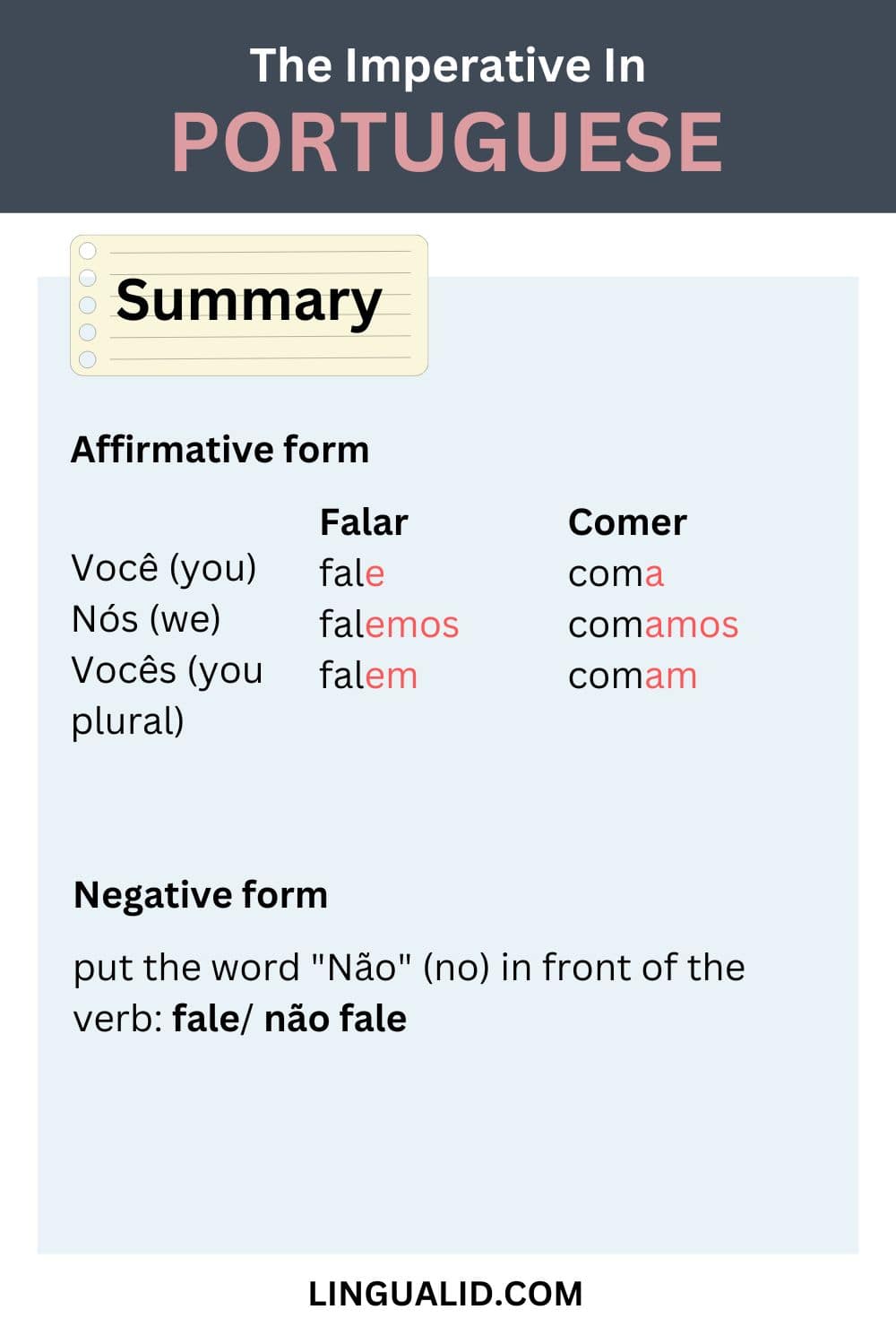In this lesson, we will talk about the imperative in Portuguese, and how to use it in both formal and informal forms.

Imperative in Portuguese
The imperative (also known as command) is the tense used when we want to give an order, or recommend or request something, and in Portuguese, it’s formed easily by replacing the endings “ar, er, ir” with the appropriate ending, look at the following tables:
Verbs ending with AR
| Pronoun | imperative ending |
| Você (you) | -e |
| Nós (we) | -emos |
| Vocês (you plural) | -em |
Example: Estudar (to study):
| Pronoun | imperative |
| Você (you) | estude |
| Nós (we) | estudemos |
| Vocês (you plural) | estudem |
Example: Falar (to speak)
| Pronoun | imperative |
| Você (you) | fale |
| Nós (we) | falemos |
| Vocês (you plural) | falem |
Verbs ending with ER
| Pronoun | imperative ending |
| Você (you) | -a |
| Nós (we) | -amos |
| Vocês (you plural) | -am |
Example: aprender (to learn)
| Pronoun | imperative |
| Você (you) | aprenda |
| Nós (we) | aprendamos |
| Vocês (you plural) | aprendam |
Example: comer (to eat)
| Pronoun | imperative |
| Você (you) | coma |
| Nós (we) | comamos |
| Vocês (you plural) | comam |
Verbs ending with IR
| Pronoun | imperative ending |
| Você (you) | -a |
| Nós (we) | -amos |
| Vocês (you plural) | -am |
Example: decidir (to decide)
| Pronoun | imperative |
| Você (you) | decida |
| Nós (we) | decidamos |
| Vocês (you plural) | decidam |
Example: partir (to leave)
| Pronoun | imperative |
| Você (you) | parta |
| Nós (we) | partamos |
| Vocês (you plural) | partam |
Note: you can practice what you’ve learned here, and learn how to pronounce each of the words in our Memrise course here, don’t know how to use the platform or sign up? we’ve got you covered in this easy-to-follow tutorial here.
The Negative Form Of The Imperative
To use the imperative in its negative form, put the word “Não” (no) in front of the verb: fale/ não fale
That was the formal way of the imperative, you may get confused if chatting with a Brazilian friend online for example, as they easily use the present tense to express it, so instead of “fale comigo! – talk to me!” you’ll hear “fala comigo!” another thing, to say “falamos amanhã – let’s talk tomorrow” they’ll mostly say “vamos falar amanhã”

The Imperative in Portuguese: A Study Guide
Quiz
Instructions: Answer the following questions in 2-3 sentences.
- What is the imperative mood used for in Portuguese?
- How do you form the imperative mood for verbs ending in “-ar”? Provide an example.
- How do you form the imperative mood for verbs ending in “-er”? Provide an example.
- How do you form the imperative mood for verbs ending in “-ir”? Provide an example.
- How do you form the negative imperative in Portuguese?
- What is an informal way Brazilians might express the imperative?
- How would a Brazilian person likely say “Let’s talk tomorrow”?
- What is the English translation of “fale comigo”?
- What is the English translation of “comamos agora”?
- What is the English translation of “não estudem aqui”?
Answer Key
- The imperative mood is used to give commands, make requests, or offer suggestions.
- To form the imperative for “-ar” verbs, replace the “-ar” with the appropriate ending based on the pronoun. For example, “falar” (to speak) becomes “fala” (you – informal, singular), “falemos” (we), “falem” (you – plural).
- For “-er” verbs, replace “-er” with the appropriate ending: “-a” (you – informal, singular), “-amos” (we), “-am” (you – plural). For example, “aprender” (to learn) becomes “aprenda” (you – informal, singular), “aprendamos” (we), “aprendam” (you – plural).
- For “-ir” verbs, replace “-ir” with the appropriate ending: “-a” (you – informal, singular), “-amos” (we), “-am” (you – plural). For example, “partir” (to leave) becomes “parta” (you – informal, singular), “partamos” (we), “partam” (you – plural).
- To form the negative imperative, place “Não” (no) before the verb. For example, “fale” (speak) becomes “não fale” (don’t speak).
- Brazilians often use the present tense as an informal way to express the imperative. For example, instead of “fale comigo!” (talk to me!), they might say “fala comigo!”.
- A Brazilian person would likely say “Vamos falar amanhã” for “Let’s talk tomorrow.”
- “Fale comigo” translates to “Talk to me” in English.
- “Comamos agora” translates to “Let’s eat now” in English.
- “Não estudem aqui” translates to “Don’t study here” in English.
Happy learning!
Oualid Cheddadi is the founder of Lingualid, a platform that inspires independent language learners worldwide, regardless of the language they are learning. The name “Lingualid” is derived from the Portuguese word for “language,” “língua,” and the last three letters of Oualid’s name, “Lid.”



